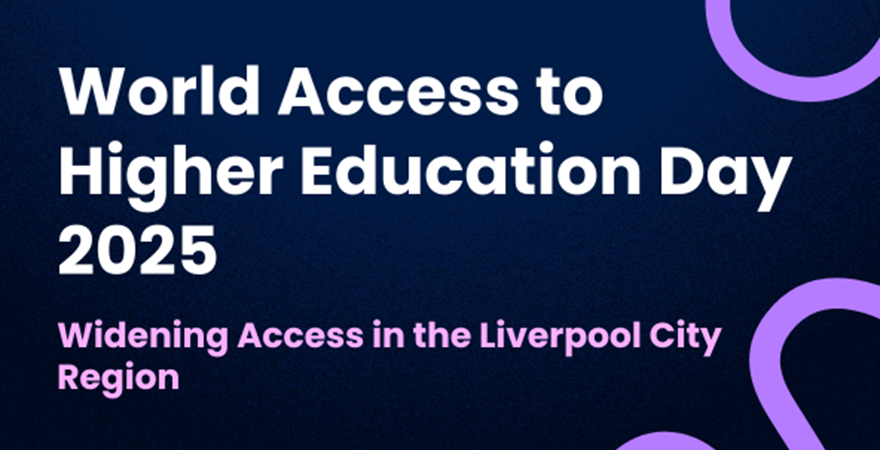
Written by Vicky McClymont, Access to HE Development Manager at Open Awards
World Access to Higher Education Day 2025
Widening Access to Higher Education in the Liverpool City Region: Innovation, Opportunity and Lifelong Learning.
Tuesday 28th October 2025 marks World Access to Higher Education Day – an annual event that aims to provide opportunities for conversations at international, regional and local level, discussing the inequalities in Higher Education access and success.
The theme of this years’ event is ‘Opportunity, Innovation, and Lifelong Learning’, something that Open Awards’ mission to ‘support educational achievement for all’ can fully support. And whilst one of our most popular qualification suites, the Access to HE Diploma, goes a long way in supporting adult learners to progress to study at HE, widening participation in HE remains a critical challenge across the UK.
This challenge is particularly pertinent to Open Awards providers, with 32% of our providers based in the North West of England – an area of the country where improving progression to HE rates is central to local HEI’s access and widening participation policies.
The challenge of Educational Disadvantage
One of the main challenges that widening participation initiatives are faced with, is socio-economic disadvantage. Our local area, the Liverpool City Region, exemplifies this challenge, with persistent barriers to educational attainment and progression. The Shaping Futures report, ‘The Demographics and Educational Disadvantage in the Liverpool City Region’ (2025) highlights that areas such as Knowsley and Liverpool have some of the highest deprivation scores in England, with Knowsley scoring 43.0 on the Index of Multiple Deprivation, and Liverpool scoring 42.4.
Educational outcomes reflect these challenges: only 57.4% of students in Liverpool achieve grade 4 or above in English and Maths GCSEs, compared to the national average of 64.6%. High rates of free school meals (FSM) eligibility further compound the issue, with the Ruskin Institute for Social Equity (RISE) report ‘Coast to Country: Higher Education Cold Spots in England’ (2025) noting Knowsley having the second lowest HE participation rate in the country for urban areas based on learners who come from a free school meals background, standing at just 13.1% of learners.
Spotlight on Knowsley
Knowsley remains one of the least improved areas in terms of HE progression. Despite local council efforts through initiatives like ‘Knowsley Better Together’, progress has been slow. DfE consistently places Knowsley in the lowest quintile for HE progression. Barriers include transport links, digital exclusion, and a lack of local HE provision. Addressing these requires sustained investment and targeted outreach.
HEIs driving change
Local HEIs acknowledge the challenge faced and are actively working to widen access and improve educational outcomes. The University of Liverpool’s strategic framework ‘Liverpool 2031’ embeds widening access within its core mission, aiming to transform lives through inclusive education and research (University of Liverpool, 2025.) Liverpool John Moores University (LJMU) runs several targeted programmes such as ‘Access all Areas’, ‘Step-Up’, and ‘Law factor’, which have supported thousands of students from underrepresented backgrounds (LJMU, 2025). These initiatives include mentoring, residential experiences, and tailored support for care-experienced, and SEND learners.
In 2025, LJMU launched their latest ‘Access and Widening Participation Plan’, which over the next four years, aims to be “an inclusive civic university that transforms lives and futures by widening participation, promoting equality, diversity and inclusion, and improving student success across all backgrounds” (LJMU, 2025). The plan acknowledges the Liverpool City Region as being one of the most economically deprived areas in England, with an emphasis on raising pre-16 attainment, especially in areas like Knowsley and Liverpool by working with local schools to raise aspirations, improve access, and narrow the continuation, completion, and degree attainment gaps of learners from deprived areas.
In 2022, Edge Hill University were nominated in the Times Higher Education Awards in the category of Widening Participation Initiative of the Year, for their commitment to widening access to medicine for learners in the local areas from disadvantaged backgrounds, redressing the balance in what is traditionally an ‘elite’ profession. The university is currently in the process of developing a new Widening Access to Medicine strategy, ready for launch in 2026.
The Liverpool City Region faces education challenges, but local HEIs are making significant progress in widening access. Innovation and lifelong learning is also key to widening participation. Shaping Futures has launched adult learner outreach programmes and resources for SEND learners, promoting inclusive transitions and advocacy skills. Local HEIs are also developing flexible entry routes and community-based learning hubs to support adult and non-traditional learners.
Continued collaboration, innovation and investment are essential to ensure that all learners, regardless of background, can benefit from higher education and as an awarding organisation where our vision is to ‘change lives through learning’, we will do our utmost to support that cause.
